尼日利亚税收制度概述
尼日利亚
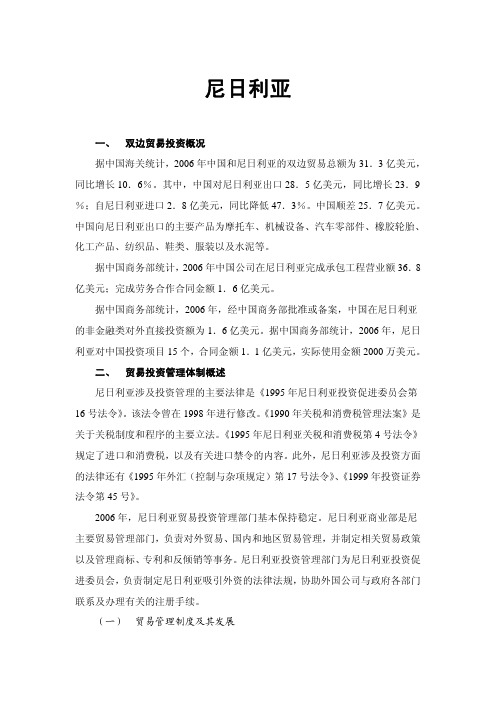
尼日利亚一、 双边贸易投资概况据中国海关统计,2006年中国和尼日利亚的双边贸易总额为31.3亿美元,同比增长10.6%。
其中,中国对尼日利亚出口28.5亿美元,同比增长23.9%;自尼日利亚进口2.8亿美元,同比降低47.3%。
中国顺差25.7亿美元。
中国向尼日利亚出口的主要产品为摩托车、机械设备、汽车零部件、橡胶轮胎、化工产品、纺织品、鞋类、服装以及水泥等。
据中国商务部统计,2006年中国公司在尼日利亚完成承包工程营业额36.8亿美元;完成劳务合作合同金额1.6亿美元。
据中国商务部统计,2006年,经中国商务部批准或备案,中国在尼日利亚的非金融类对外直接投资额为1.6亿美元。
据中国商务部统计,2006年,尼日利亚对中国投资项目15个,合同金额1.1亿美元,实际使用金额2000万美元。
二、 贸易投资管理体制概述尼日利亚涉及投资管理的主要法律是《1995年尼日利亚投资促进委员会第16号法令》。
该法令曾在1998年进行修改。
《1990年关税和消费税管理法案》是关于关税制度和程序的主要立法。
《1995年尼日利亚关税和消费税第4号法令》规定了进口和消费税,以及有关进口禁令的内容。
此外,尼日利亚涉及投资方面的法律还有《1995年外汇(控制与杂项规定)第17号法令》、《1999年投资证券法令第45号》。
2006年,尼日利亚贸易投资管理部门基本保持稳定。
尼日利亚商业部是尼主要贸易管理部门,负责对外贸易、国内和地区贸易管理,并制定相关贸易政策以及管理商标、专利和反倾销等事务。
尼日利亚投资管理部门为尼日利亚投资促进委员会,负责制定尼日利亚吸引外资的法律法规,协助外国公司与政府各部门联系及办理有关的注册手续。
(一) 贸易管理制度及其发展1.关税制度西非国家经济共同体(简称西共体)于2006年正式推出了共同关税制度。
西共体各成员国批准的共同关税制度包括4个方面,即初级产品进口关税税率为5%;半成品进口关税税率为10%,如原材料及其他工业产品;工业制成品关税税率为20%;奢侈品关税税率为50%。
油气企业在尼日利亚投资相关涉税问题

措施 ,希望能 为我国石油企业 实施 “ 走出去 ”战 略时处理 缴纳个 人所得 税 ,非尼 日利亚本 国居民仅 就其在尼 目利亚
好海外纳税 问题提供 指导和借鉴 。
一
获得 的收益 缴税 。但尼 日利亚 法律 规定 ,如非尼 日利亚居 民在 1 2个 月的期 间 内,在 尼 日利亚 居住 1 8 3天 以上 ( 含
பைடு நூலகம்
将 上一年度公 司财 务审计报告上交 联邦国内税收局 ,否则 职工每年 享受 3 0 0 0 奈拉 ,或者是相 当于 2 0 %的工资收入
按 照迟交天数进行相应罚款 。
( 二 )个人 所得 税
金 额作为残疾补助金 。
4 .额外津 贴 。下列两 种津贴 也可 免于征 税 : ( 1 )每
月薪 、周薪 、 津 贴补 助 、 奖金 、 交 易盈余 、 利息 、分红 、 1 9 9 3年 以来我 国石油企业 的海 外油气合作业务发展迅 括 : 猛 ,但 与此相关 的税务管理却 明显滞后 。本文总 结了中国 养老金 、年 金 ,以及来 自于许可他 人使用或占用其财产所
石油在尼 日利亚开展海外 油气 合作 7 年来 的办税 情况 ,提 获得 的收益等 。只要是个 人收入所 得 ,都要 依法纳税 。 出 了在尼 日利亚开展海外油气合作 业务可采取 的相关 税收
2 .纳税人 : 一般为生产企业 、批发商、进 口商。增值 部门代扣代缴公司所得税和个人所得税。付款方在支付费
税纳 税人必须在公司运营 后 6 个 月内履行增值税 注册。除 用时直接按 比例 代扣 ,收款方可 以凭付款 方开具 的发票 ,
从事上述商品或服务 的企业 以外 ,其他所有企业 均须在联 在 申报所得税时予以抵免 。尼 日利亚税法规定付款方最迟
税务规划尼日利亚财产征税扶贫方法的可持续发展挑战与前景
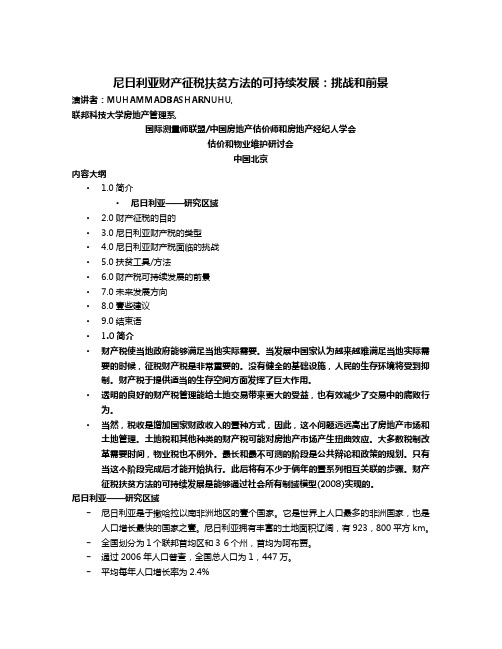
尼日利亚财产征税扶贫方法的可持续发展:挑战和前景演讲者:MUHAMMADBASHARNUHU,联邦科技大学房地产管理系,国际测量师联盟/中国房地产估价师和房地产经纪人学会估价和物业维护研讨会中国北京内容大纲• 1.0简介•尼日利亚——研究区域• 2.0财产征税的目的• 3.0尼日利亚财产税的类型• 4.0尼日利亚财产税面临的挑战• 5.0扶贫工具/方法• 6.0财产税可持续发展的前景•7.0未来发展方向•8.0壹些建议•9.0结束语• 1.0简介•财产税使当地政府能够满足当地实际需要。
当发展中国家认为越来越难满足当地实际需要的时候,征税财产税是非常重要的。
没有健全的基础设施,人民的生存环境将受到抑制。
财产税于提供适当的生存空间方面发挥了巨大作用。
•透明的良好的财产税管理能给土地交易带来更大的受益,也有效减少了交易中的腐败行为。
•当然,税收是增加国家财政收入的壹种方式,因此,这个问题远远高出了房地产市场和土地管理。
土地税和其他种类的财产税可能对房地产市场产生扭曲效应。
大多数税制改革需要时间,物业税也不例外。
最长和最不可测的阶段是公共辩论和政策的规划。
只有当这个阶段完成后才能开始执行。
此后将有不少于俩年的壹系列相互关联的步骤。
财产征税扶贫方法的可持续发展是能够通过社会所有制域模型(2008)实现的。
尼日利亚——研究区域-尼日利亚是于撒哈拉以南非洲地区的壹个国家。
它是世界上人口最多的非洲国家,也是人口增长最快的国家之壹。
尼日利亚拥有丰富的土地面积辽阔,有923,800平方km。
-全国划分为1个联邦首均区和36个州,首均为阿布贾。
-通过2006年人口普查,全国总人口为1,447万。
-平均每年人口增长率为2.4%-有250多个部族-尼日利亚位于非洲西部-南濒大西洋几内亚湾。
西同贝宁接壤,北和尼日尔交界,东北隔乍得湖和乍得相望,东和东南和喀麦隆毗连。
-尼日利亚于2007年经济外汇储备为513.2亿美元,而于2002年只有76.81亿美元。
NIGERIA TAX TYPES尼日利亚税收种类

COMPANIES INCOME TAX (CIT).Applicable tax law- Companies Income Tax Act. Persons subject to the Companies Income Tax:∙All companies incorporated in Nigeria with the exception of companies engaged in petroleum operations.∙All non-resident (foreign) companies that earn or derive income from Nigeria.∙All organizations limited by guarantee (institutions of public character or charitable organizations) engaged in profit making activities other than thepromotion of their primary objects.∙The liquidator, receiver, or agent of liquidator or receiver of any taxable company or organization.Where to pay the Companies Income Tax:∙Companies incorporated in Nigeria and organizations limited by guarantee pay Companies Income Tax through any of the designated banks. Once paymenthas been captured by the bank collecting system, an e-ticket is issued is issuedthe company, this e-ticket is proof of payment and when presented at theIntegrated Tax Office with jurisdiction an e-receipt will be issued.∙Non-resident companies make payment through remittance of tax deducted at source to the designated banks.How to pay the Companies Income Tax∙Resident companies and organizations prepare and submit annual self-assessment tax returns as specified by FIRS accompanied by the evidence ofthe payment of the full amount or first installment of the tax due. Payment ismade to designated banks∙Non-resident companies are subject to Withholding Tax (WHT) deductions on the income they earn from Nigeria. This becomes their tax upon filing returnsPETROLEUM PROFITS TAX (PPT)Applicable tax law- Petroleum Profits Tax Act. Persons subject to the Petroleum Profits Tax:∙Companies engaged in petroleum exploration and production operations in Nigeria (up-stream operations)∙ A person resident in Nigeria employed in the management of the petroleum operations carried on by a non-resident company∙The liquidator, receiver, or agent of liquidator or receiver of any company carrying on petroleum operations in Nigeria.Where to pay the Petroleum Profits Tax:Companies carrying on petroleum operations in Nigeria make offshore payments to JP Morgan Chase Bank, the bank then advises the Central Bank of Nigeria to enable the bank credit FIRS accordingly.How to pay the Petroleum Profits TaxEvery company engaged in petroleum operations prepares and submits annual returns as specified by the Petroleum Profits Tax Act within five months of the end of each assessment year. Payment is in two segments beginning with filing of estimated annual return not later than ending of February of each year. Payment for the tax due is then made in twelve monthly installments beginning from March of each year. Where the actual tax liability arising from the annual tax returns exceeds the cumulative estimated tax, a 13th month installment is payable and where the contrary is the case, a refund is due.VALUE ADDED TAX (VAT)Applicable tax law- Value Added Tax Act. Persons subject to the Value Added Tax: Any individual, corporation sole, group, body corporate or organization that consumes buys, procures or imports taxable goods or services is liable to pay the tax. How to pay the Value Added Tax∙During direct sales or open market transactions, the buyer or consumer shall pay the tax to the seller together with the cost of the goods or services bought. Theseller then nets off the VAT paid at the time of purchase of the stocks sold fromthe VAT collected on the stocks sold and credit the balance to FIRS.∙Where the goods or services were supplied to a government Ministry, Department or Agency (MDA) or a company engaged in oil operations, the VAT payable by the MDA or oil company is deducted or withheld at source (at thepoint of payment). It is then credited directly to FIRS on behalf of the supplier ∙VAT payments are made on a monthly basis not later than 21days of every subsequent month. Tax payers prepare and submit monthly VAT returnsaccompanied by evidence of payment of the tax due at designated banksWhere to pay the Value Added TaxVAT remittances may be made at any designated bank, an e-ticket is immediately issued as evidence of payment. This e-ticket may be presented at the ITO and an e-receipt will be issued the taxpayer.PERSONAL INCOME TAX (PIT)Applicable tax law- Personal Income Tax Act (PITA)∙Persons subject to the Personal Income Tax Individuals resident in the Federal Capital Territory, Abuja∙Families, communities, trustees and estates resident in the Federal Capital Territory∙Persons employed in the Nigerian Army, Nigerian Navy, Nigerian Air Force and Nigeria Police other than in civilian capacity.∙ A person resident outside Nigeria who derives income or profit from Nigeria ∙Officers of the Nigerian foreign serviceWhere to pay the Personal Income Tax∙Persons employed in the Nigerian Army, Nigerian Navy, Nigerian Air Force and Nigeria Police, other than in civilian capacity, pay income tax at the designated banks∙Individuals and enterprises in FCT pay at the designated banks, obtain an e-ticket and may request an e-receipt at the Individual and Enterprise Tax Office, Abuja.∙Organizations, companies and MDAs pay at designated banks, obtain their e-tickets and may request for the e-receipts at the Large Tax Office (LTO) Abuja. How to pay the Personal Income Tax∙Persons on paid employment pay their personal income tax through the Pay As You Earn (PAYE) system. Under the system, employers deduct the prescribed tax from workers’ salaries and pay directly to the FIRS through the designatedbanks on behalf of the employees on a monthly basisAny individual, corporation sole, group, body corporate or organizationSelf-employed individuals and enterprises prepare and submit annual self-assessment tax returns as specified by FIRS accompanied with evidence of payment of the full amount or first installment of the tax due. All payments are made at the designated banks.WITHHOLDING TAX (WHT)Applicable tax lawWithholding Tax (WHT) is not a distinct tax type and therefore has no legislation of its own. It is only a mechanism for the collection of other taxes. Consequently, its application is provided for in the enabling law of other tax types i.e. Section 81 of Company Income Tax Act, Section 54 of Petroleum Profit Tax Act, Section 73 of Personal Income Tax Act and Section 13 of Value Added Tax ActPersons subject to the Withholding TaxPersons subject to the various tax types may be subject to Withholding Tax deductions for the purpose of offsetting their tax liabilities. WHT deductions are regarded as advance payments (or payments on account) of the relevant tax liability that will arise from the tax returns of the period concerned.Where to pay the Withholding Tax:Where the person benefiting from the payment and the income are taxable, Withholding Tax (WHT) is paid (deducted) at the point of making payment. It is withheld by the payee and the net amount is then paid to the beneficiary through the designated bank(s).How to pay Withholding TaxThe amount deducted at the point of payment is remitted directly to FIRS through a designated bank in a prescribed format in the name of the person subject to the deduction.EDUCATION TAX (EDT)Tertiary Education Trust Fund (Establishment, Etc) Act, 2011. Persons subject to the Education TaxAll companies liable to Companies Income Tax are also liable to Education Tax. In other words, all companies registered or resident in Nigeria are liable to pay Education Tax. Where to pay the Education Tax:Education Tax is paid at the point of payment of Companies Income Tax or Petroleum Profits TaxHow to pay the Education TaxAs part of the annual Companies Income Tax self-assessment returns, taxable persons also compute and submit their Education Tax liabilities and make payment at the designated bankSTAMP DUTIES (STD)Stamp Duties Act. Persons subject to Stamp DutiesThe items and persons subject to stamp duties are instruments (written documents) relating to matters executed between a company and an individual, group or body of individuals. Instruments which may be subject to stamp duties include financial instruments/transactions, company memorandums and articles of association, statements of share capital ownership, bonds, conveyances on sale, depositions, lease agreements, mortgage bonds, debentures, etc.Where to pay Stamp DutiesStamp duties on eligible instruments can be paid through designated banksHow to pay the Stamp DutiesCompanies and persons issuing or dealing with all chargeable instruments shall submit such instruments to the Stamp Duties Office for stamping. The Commissioner of Stamp Duties shall then assess the instruments submitted in line with the provisions of the Stamp Duties Act and specify the duties payable. The duties are then paid to FIRS at the designated bankCAPITAL GAINS TAX (CGT)Capital Gains Tax Act. Persons and properties subject to the Capital Gains TaxAll companies incorporated in Nigeria which earn any capital gains or gains on the disposal of all forms of assets. All forms of property (whether situated in Nigeria or not) that are liable to capital gains tax include:∙Options, debts and incorporeal property generally;∙Any currency other than Nigerian currency; and∙Any form of property created by the person disposing of it, or otherwise coming to be owned without being createdWhere to pay the Capital Gains TaxCapital Gains Tax is paid at the designated at which the company making the chargeable capital gain pays its Companies Income Tax.How to pay the Capital Gains TaxIn line with the provisions of the Capital Gains Tax Act and the self-assessment regulations presently in operation, a company shall compute the gains on the disposal of all forms of assets in each year of assessment and submit same together with its Companies Income Tax returns. The returns shall also be accompanied by evidence of the payment of the full amount or first instalment of the tax due. Payment is made to the designated bank.NATIONAL INFORMATION TECHNOLOGY DEVELOPMENT FUND (NITDF) LEVY National Information Technology Development Agency Act, 2007. Persons subject to the NITDF LevyCompanies and enterprises with an annual turnover of N100,000,000.00 and above operating as:∙GSM Service Providers or telecommunications companies;∙Cyber companies and internet providers;∙Pensions managers and pension related companies;∙Banks and other financial institutions;∙Insurance companies.Where to pay the NITDF LevyThe levy is paid through the designated bank at which the chargeable companies pay their Companies Income TaxHow to pay the NITDF LevyAs part of its Companies Income Tax returns, a company shall compute 1% of the profit before tax of each year of assessment. The tax due shall then be paid to FIRS through the designated bank.。
尼日利亚工资标准-概述说明以及解释
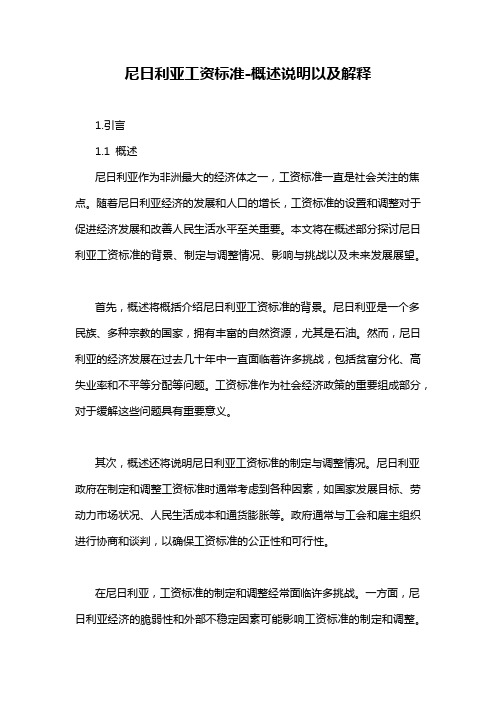
尼日利亚工资标准-概述说明以及解释1.引言1.1 概述尼日利亚作为非洲最大的经济体之一,工资标准一直是社会关注的焦点。
随着尼日利亚经济的发展和人口的增长,工资标准的设置和调整对于促进经济发展和改善人民生活水平至关重要。
本文将在概述部分探讨尼日利亚工资标准的背景、制定与调整情况、影响与挑战以及未来发展展望。
首先,概述将概括介绍尼日利亚工资标准的背景。
尼日利亚是一个多民族、多种宗教的国家,拥有丰富的自然资源,尤其是石油。
然而,尼日利亚的经济发展在过去几十年中一直面临着许多挑战,包括贫富分化、高失业率和不平等分配等问题。
工资标准作为社会经济政策的重要组成部分,对于缓解这些问题具有重要意义。
其次,概述还将说明尼日利亚工资标准的制定与调整情况。
尼日利亚政府在制定和调整工资标准时通常考虑到各种因素,如国家发展目标、劳动力市场状况、人民生活成本和通货膨胀等。
政府通常与工会和雇主组织进行协商和谈判,以确保工资标准的公正性和可行性。
在尼日利亚,工资标准的制定和调整经常面临许多挑战。
一方面,尼日利亚经济的脆弱性和外部不稳定因素可能影响工资标准的制定和调整。
另一方面,劳动力市场的不平衡和劳动力组织的权益保护问题也是制定和调整工资标准时需要关注的因素。
尼日利亚工资标准的制定与调整对社会经济发展具有重要影响。
适当的工资标准可以激励劳动力的工作积极性、提高生产力,并促进经济增长。
然而,不合理的工资标准可能导致劳动力的不稳定和社会的不平衡。
最后,概述将提供对尼日利亚工资标准的未来发展的展望。
随着尼日利亚经济的不断发展,工资标准的制定与调整将面临更多的挑战和机遇。
政府需要制定更加灵活和适应性强的政策,以缓解贫富差距,提高人民的生活水平。
同时,政府还需要与各方积极合作,加强对劳动力市场和劳动力组织的监管,以确保工资标准的公正性和可持续性。
综上所述,尼日利亚工资标准是一个复杂而重要的议题。
本文将在接下来的章节中深入探讨尼日利亚工资标准的制定与调整情况、影响与挑战以及未来的发展展望。
尼日利亚税收征收管理体制简介
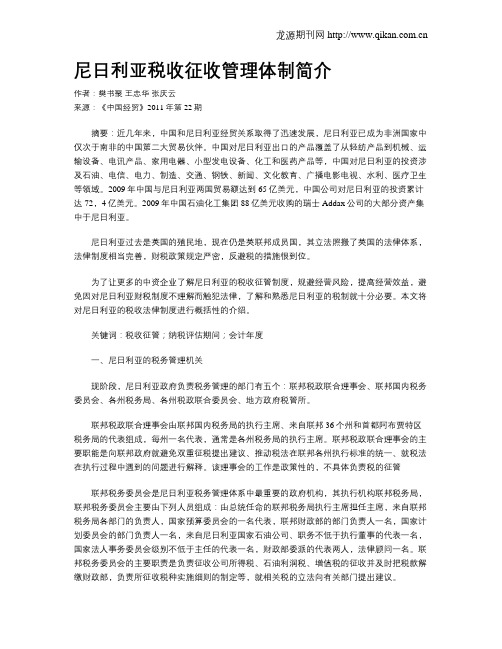
尼日利亚税收征收管理体制简介作者:樊书聚王忠华张庆云来源:《中国经贸》2011年第22期摘要:近几年来,中国和尼日利亚经贸关系取得了迅速发展,尼日利亚已成为非洲国家中仅次于南非的中国第二大贸易伙伴。
中国对尼日利亚出口的产品覆盖了从轻纺产品到机械、运输设备、电讯产品、家用电器、小型发电设备、化工和医药产品等,中国对尼日利亚的投资涉及石油、电信、电力、制造、交通、钢铁、新闻、文化教育、广播电影电视、水利、医疗卫生等领域。
2009年中国与尼日利亚两国贸易额达到65亿美元,中国公司对尼日利亚的投资累计达72,4亿美元。
2009年中国石油化工集团88亿美元收购的瑞士Addax公司的大部分资产集中于尼日利亚。
尼日利亚过去是英国的殖民地,现在仍是英联邦成员国,其立法照搬了英国的法律体系,法律制度相当完善,财税政策规定严密,反避税的措施很到位。
为了让更多的中资企业了解尼日利亚的税收征管制度,规避经营风险,提高经营效益,避免因对尼日利亚财税制度不理解而触犯法律,了解和熟悉尼日利亚的税制就十分必要。
本文将对尼日利亚的税收法律制度进行概括性的介绍。
关键词:税收征管;纳税评估期间;会计年度一、尼日利亚的税务管理机关现阶段,尼日利亚政府负责税务管理的部门有五个:联邦税政联合理事会、联邦国内税务委员会、各州税务局、各州税政联合委员会、地方政府税管所。
联邦税政联合理事会由联邦国内税务局的执行主席、来自联邦36个州和首都阿布贾特区税务局的代表组成,每州一名代表,通常是各州税务局的执行主席。
联邦税政联合理事会的主要职能是向联邦政府就避免双重征税提出建议、推动税法在联邦各州执行标准的统一、就税法在执行过程中遇到的问题进行解释。
该理事会的工作是政策性的,不具体负责税的征管联邦税务委员会是尼日利亚税务管理体系中最重要的政府机构,其执行机构联邦税务局,联邦税务委员会主要由下列人员组成:由总统任命的联邦税务局执行主席担任主席,来自联邦税务局各部门的负责人,国家预算委员会的一名代表,联邦财政部的部门负责人一名,国家计划委员会的部门负责人一名,来自尼日利亚国家石油公司、职务不低于执行董事的代表一名,国家法人事务委员会级别不低于主任的代表一名,财政部委派的代表两人,法律顾问一名。
尼日利亚矿业政策
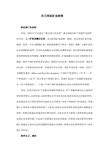
尼日利亚矿业政策特定部门负责制首先,2007矿产法通过“特定部门负责制”确定国家对矿产资源开发的管理手段。
设立矿权地籍办公室,作为管理矿权的唯一机构,负责受理矿权申请;批准、签发、中止及撤销矿权;接收和处置关于转让,更新、调整、让渡矿权及矿权范围的扩展等。
中央矿权地籍办公室设在首都阿布贾,对全国范围有最高的排他性的职权及管辖权。
根据管理便利的需要,矿权地籍办公室在全国设有分支机构,提供下列矿权注册登记项目:勘探许可证注册、探测许可证注册、采矿租约注册、小型采矿租约注册、水使用许可证注册、采矿许可注册。
同时,在矿产及钢铁发展部(Mines and Steel Development)下设矿产监查部门(17节)、矿产环保部门(18节)和小型及个体采矿部门,形成中央以矿产及钢铁发展部部长(以下简称部长)、下属三个部门和矿权地籍办公室各司其职的管理体系。
其次,在各州设立矿产资源及环境管理委员会,矿产资源理事会及土地使用和分配理事会。
总体来说,这些理事会并不对矿权及矿权持有者进行直接的管理,而是通过关注与采矿相关的当地社会公共利益,向各个职能部门作出建议,形成独立于管理者与被管理者的第三方意见,促使中央在管理矿权的过程中兼顾地方利益。
理事会的建议对象是部长和州政府,后者会在多大程度上采纳理事会的建议现在还无例可循,不过由于法律规定其在涉及赔偿、环保和土地分配等具体问题上的建议义务以及这些问题所代表的大宗利益,理事会在矿权管理环节上很可能大有作为。
程序公正、透明2007矿产法在矿权的申请和所有权方面做了一系列安排,基本可以保证程序的公正。
在矿权申请阶段,规定了“先到先得”制:当数份针对同一区域的申请,两个或以上有地点重叠的申请在同一个工作日被提交给矿权地籍办公室时,最早收到的符合规定的申请有优先权;当遇有针对同一专有区域的竞争性申请时,矿业地籍委员会必须严格遵照本法规定的“先到先受理”原则(8节)。
确定矿权区域的专属权,规定不得在同一区域重复设置矿权(58、60、65、68节)。
尼日利亚几项税收规定在实际工作中运用的思考

尼日利亚几项税收规定在实际工作中运用的思考贺炬【摘要】根据尼日利亚联邦政府的规定,政府项目在支付合同价款时由业主代扣两项税款,既5%增值税V.A.T和5%所得税Withholding。
这种有别于他国由付款人扣税的方法叫源头扣税。
这种方法虽然有利于保证政府的税收,防止税款的流失,但对于经营者来说则是强制执行的,而且往往有失公允。
如何使我们的经营活动适应尼国代扣税款的实际,如何使损失降低到最低限度,是我们每个经营环节都应深入研讨的课题。
本文仅就当地税款计算和代扣的几个问题做一些粗浅的探讨,以期对我们的经营工作有所裨益。
【期刊名称】《当代经济》【年(卷),期】2012(000)012【总页数】2页(P86-87)【关键词】税收规定;代扣税款;税款计算【作者】贺炬【作者单位】中国土木工程集团有限公司,北京100038【正文语种】中文【中图分类】F812.42根据尼日利亚联邦政府的规定,政府项目在支付合同价款时由业主代扣两项税款,既5%增值税V.A.T和5%所得税Withholding。
这种有别于他国由付款人扣税的方法叫源头扣税。
这种方法虽然有利于保证政府的税收,防止税款的流失,但对于经营者来说则是强制执行的,而且往往有失公允。
比如所得税的代扣,并不象一些西方发达国家那样进行年终汇算清缴,而是只上缴不清算,或者不能取得扣税收据,不能抵减应纳税数。
其结果可能有二:其一,相对于公司财务成果而言造成税款的多缴;其二,造成税款的提前入库。
这两种结果对承包商都是不利的。
前者是一种损失,后者影响经营者的资金运用,最少也会损失部分利息。
按这种强制性的做法,如果税款代扣太多,几年以后有可能争取一个缓扣所得税的“优惠待遇”。
但我们应考虑的问题是:若干年以后时过境迁,各种情况都有可能发生变化,造成的损失很有可能无法挽回。
从另一方面看,如果抛开“时过境迁”不谈,我们目前所承揽的项目确实利润颇丰,实际利润率达到或超过临界比率23.81%,那么争取几年后的缓扣税是有利的。
尼日利亚市场及政策分析.pptx

5.出口加工区:
油气
……
6.科技工业园:高科技、创新产业
7.经济开发区:多种产业
中国商务部西亚非洲司
13
2010年3月
投资:鼓励措施
《尼日利亚出口加工区法》(1992)
--鼓励非石油出口导向型制造业
--优惠政策:
1.一站式服务
2.全免税(政府、关税、原材料进口)
3.资本金、利润自由流动
4.100%外资
391项,1028亿美元 --非洲占28%
尼日利亚34亿美元 加纳15亿美元 科特迪瓦14亿美元
“421”备选项目
79 285
664
亚洲 非洲 拉美及其它地区
“421”备选项目行业划分
冶金 7%
机车船舶 10%
建材 5%
电力设备 30%
石化 23%
通讯 25%
中国商务部西亚非洲司
36
2010年3月
III. “走出去”政策-境外承包与投
中国商务部西亚非洲司
10
2010年3月
税制
资本收益税: 收益10% 增值税: 5% 教育税: 2% 中尼关于对所得避免双重征税和防止偷漏税的协定
2002年4月15日签署,2010年1月1日起执行
中国商务部西亚非洲司
11
2010年3月
投资:重点领域
电力供应 固体矿产 交通设施 农业 石油、天然气 制造业:纺织、水泥、饮料、日化
2930政府中非合作论坛国家开发银行中非发展基金中国进出口银行中国出口信用保险公司企业并购国际招投标31投资援助承包中非发展基金资源贷款项目一揽子合资合作混合贷款对外经济技术合作专项资金?政府贴息优惠贷款?无偿援助?无息贷款321在应对气候变化方面加强合作为非洲援建太阳能沼气小水电等100个清洁能源项目
企业税与个税缴纳:尼日利亚
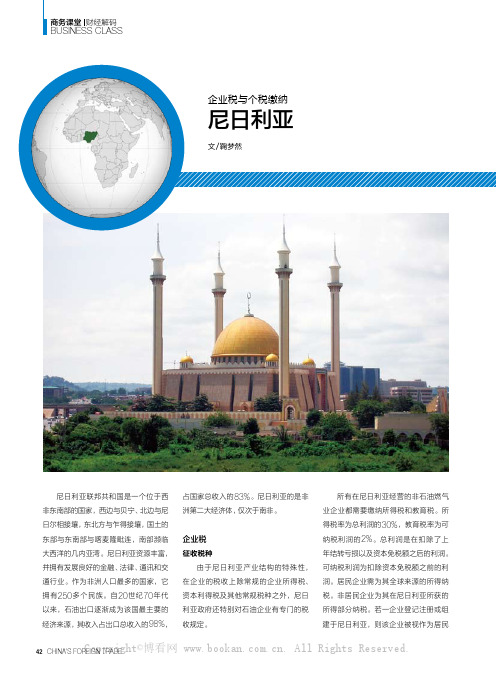
商务课堂BUSINESS CLASS尼日利亚联邦共和国是一个位于西非东南部的国家,西边与贝宁、北边与尼日尔相接壤,东北方与乍得接壤,国土的东部与东南部与喀麦隆毗连,南部濒临大西洋的几内亚湾。
尼日利亚资源丰富,并拥有发展良好的金融、法律、通讯和交通行业。
作为非洲人口最多的国家,它拥有250多个民族。
自20世纪70年代以来,石油出口逐渐成为该国最主要的经济来源,其收入占出口总收入的98%,占国家总收入的83%。
尼日利亚的是非洲第二大经济体,仅次于南非。
企业税征收税种由于尼日利亚产业结构的特殊性,在企业的税收上除常规的企业所得税、资本利得税及其他常规税种之外,尼日利亚政府还特别对石油企业有专门的税收规定。
所有在尼日利亚经营的非石油燃气业企业都需要缴纳所得税和教育税。
所得税率为总利润的30%,教育税率为可纳税利润的2%。
总利润是在扣除了上年结转亏损以及资本免税额之后的利润。
可纳税利润为扣除资本免税额之前的利润。
居民企业需为其全球来源的所得纳税。
非居民企业为其在尼日利亚所获的所得部分纳税。
若一企业登记注册或组建于尼日利亚,则该企业被视作为居民财经解码Copyright©博看网 . All Rights Reserved.42CHINA'S FOREIGN TRADE企业。
财政年度的持续周期为1月1日至12月31日。
企业可选择任意日期作为其会计年度的截止日,但提交纳税申报单的日期不得晚于会计年度结束后六个月。
若纳税人提交自评税报告并申请分期付款的,其税款最多可分成六期每月等额缴付。
而石油燃气业内的企业以及向原油企业提供工程和咨询服务的企业由独立的税法管理。
处于石油燃气业上游环节的居民企业享有不同的税率。
该税率包含某些新产品共享合同的50%以及其他处于营业首五年时期企业的65.75%,且在此期间所有营业前支出都可全额摊还,然后其之后的可纳税利润的税率为85%。
处于产业链下游的企业所享税率为30%。
尼日利亚对外贸易

尼日利亚对外贸易减小字体增大字体对外贸助在国民经济中尚有重要地位,进出口贸易总体格局是出口大量原油,换取外汇,利用出口原油带来的大量顺差,偿还债务和发展本国经济和工业。
尼日利亚于1995年加人世界贸易组织,丛赞功及投资政策服从于世界贸易组织有关法律规定。
政府致力于市场化改革,不仅实施私有制计划,同时实施贸易自由化,逐步打破行业的国家袭断,撤销管制。
减少禁令,进出门政策和外汇管制相对宽松和自由。
近些年来,政府对进口关税连续渊整,对原材料、零部件和工业机械没备的进口关税大幅降低,最低调至2.5%,对一些制成品袖农产品则大副提高关税,最高达100%。
近来由于进口商姑对本同产业柄成冲击,也对外洲•:形成强烈帝求,使外汇净流出剧增,外汇储备下降。
因而尼日利亚政府制定了一系列贸易保护措施,如禁止进口商品增多,外汇管制趋紧,部分商品进口关税提冉,两拙检验趋严等。
除继续执行装运前检验外,屁日利亚政府于2001年4月开始在目的港实施100%开箱查验。
以遏制通关中的不端行为和关税流失以及减少进门。
主要出口产品为而油、呵呵、橡胶、棕榈仁等。
政府积极鼓励非石油产门、特别是农产品的出口。
近年来尼口利亚的出门产品结构为石油90•5%,农业6%,制造业2%,天然气1%,固体矿产0.5%。
主要进口产品为机械设番、卑辆、日用消费品等。
主要贸易对象国为英国、美国、德国、法国和印度等。
尼日利亚是西非一个重要贸易转口国,巧周边国家经贸交流较为活跃。
拉各斯是西非最大的港门城市,其国际机场巧港口是出入曲非的重要门户之一,各国商人在此中转的机会较多;目前在尼口利亚特别是拉各斯,除本国商人外,还汇聚了周边国家,如加纳、贝宁、喀麦隆及科特迪瓦的商人。
从拉各斯转口贝宁、多哥、科特迪乱及加纳等国;从北部的重要边际城巾卡诺和卡多那,可转口尼日尔、乍得甚至刚果 (金门从卡拉巴尔可转口喀麦隆与加蓬等国。
近年来,政府鼓励非石油产品特别是农产品出口。
尼日利亚实行市场经济体制。
尼日利亚中资建筑企业涉税业务重点简析

尼日利亚中资建筑企业涉税业务重点简析乔伟(中国土木工程集团有限公司)Trade and EconomyReport贸易与经济·综合【摘要】随着经济全球化的大潮,响应国家“走出去”和“一带一路”战略号召,国内施工企业纷纷将目光投向海外市场。
而企业在海外经营、尤其在外账处理过程中,因语言、税制和会计制度等方面不同,面临种种税务问题,可借鉴的中文版税务资料有限,经过提炼的税务简析更是少之又少。
笔者通过多年工作总结和研究,就尼日利亚中资施工企业外账中比较关键的几个涉税点进行简要分析,以期对在尼企业税务筹划提供借鉴。
【关键词】尼日利亚外账税务问题预扣税企业所得税及教育税个人所得税增值税【中图分类号】F426.22/F406.72/F814.37尼日利亚税法规定任何组织和个人都负有纳税义务。
了解和熟悉当地税法,做好外账①工作,是中资施工企业依法纳税及合理避税的基础。
下面笔者就尼日利亚中资施建筑工企业外账中四大涉税重点进行介绍和分析。
一、企业所得税及教育税教育税实质上是企业所得税的附加,二者在计税方式上有着共性。
企业所得税(简称CIT)等于应税利润×所得税率30%。
而应税利润的计算分两种情况:如果当年企业资本津贴(简称C.A.)大于允许税前抵扣的资本津贴上限②,应税利润=调整利润③-调整利润×2/3;反之,应税利润=调整利润-资本津贴。
教育税(简称ET)等于调整利润(简称A.P.)直接乘以教育税率2%。
从上面的计税方式得出结论,影响所得税的主要因素除收入、成本之外,还有固定资产资本津贴;而教育税不受固定资产的增减、折旧及资本津贴的影响。
下面根据计税特点,分析企业税务筹划空间。
(一)主营业务收入尼日利亚施工企业收入确认的依据是业主监理批复的验工计价。
一些企业因不熟悉当地税务要求,在具体外帐处理时,易出现一系列税法不认可的做法,导致当年收入确认不正确,而引起税务纠纷,下面举例说明。
例1:某施工企业2015年10月得到某政府项目批复预付款(Advance Payment)100万奈拉,扣除预扣税WHT后,实际收款95万奈拉;12月第一次验工批复计价50万奈拉,扣除质保金(Retention)5万奈拉,扣预付款减额20万奈拉,加增值税1.25万奈拉,批复净额为26.25万奈拉,计划将于2016年2月收到该笔工程款。
尼日利亚外贸注意事项

尼日利亚外贸注意事项尼日利亚是非洲大陆上最繁荣的经济体之一,外贸在尼日利亚经济发展中起着至关重要的作用。
以下是关于尼日利亚外贸的50条注意事项,并对其进行详细描述:1. 了解尼日利亚的外贸政策和法规。
尼日利亚的外贸政策和法规对出口和进口业务有着重要的影响。
了解并遵守相关的法规对于外贸交易的顺利进行至关重要。
2. 熟悉尼日利亚的进口产品清单和要求。
了解尼日利亚进口产品的清单、要求、标准和限制条件是进口商必须做好的工作,以确保产品符合当地的标准和法规。
3. 寻找可靠的尼日利亚贸易伙伴。
与可靠的尼日利亚贸易伙伴建立合作关系对于顺利开展外贸业务至关重要,可以减少风险和提高交易效率。
4. 注意尼日利亚的贸易商和代理商的信誉。
在与尼日利亚的贸易商和代理商合作时,务必注意其信誉和规模,以免发生信用风险和经营风险。
5. 关注尼日利亚的支付和结算方式。
了解尼日利亚的支付和结算方式对于外贸交易至关重要,要选择合适的支付和结算方式以降低风险。
6. 把握尼日利亚的市场需求和趋势。
了解尼日利亚的市场需求和趋势,可以帮助外贸商把握商机,推动产品的出口和市场扩展。
7. 熟悉尼日利亚的货币汇率变动。
尼日利亚的货币汇率变动可能对外贸交易产生一定的影响,外贸商需要密切关注货币汇率的变化,以制定相应的风险管理策略。
8. 注意尼日利亚的贸易行业规范和监管。
了解尼日利亚贸易行业的规范和监管制度,遵守相关规定以避免违法违规行为。
9. 理解尼日利亚的文化和宗教差异。
尼日利亚有着多样的文化和宗教背景,理解当地的文化和宗教差异有助于外贸商更好地开展业务,避免出现文化冲突。
10. 关注尼日利亚的政治和安全形势。
尼日利亚的政治和安全形势可能会对外贸业务产生一定的影响,外贸商需要密切关注政治和安全形势的变化,以制定相应的风险管理策略。
11. 适应尼日利亚的商务礼仪和习俗。
尼日利亚的商务礼仪和习俗与其他国家有所不同,外贸商需要适应当地的商务礼仪和习俗以建立良好的业务关系。
尼日利亚与中国税制比较研究

【摘要】“双循环”新发展格局下,中国与尼日利亚的经贸往来日益密切,因此充分了解东道国的税收制度成为中方企业“走出去”成功实现海外投资的重要前提。
文章主要从具体税种及税率、征收管理等方面进行税制比较,并从投资项目选择、海外税务筹划及海外人才队伍建设等方面给出建议,以期助力中方企业赴尼日利亚投资。
【关键词】税制比较;尼日利亚;中非合作【中图分类号】F810.22022年2月10日,我国和尼日利亚(以下简称“尼国”或“尼”)迎来建交51周年。
如今,尼国已成为中方在非洲的第一大出口及工程承包市场、第二大交易伙伴和重要的投资地。
在企业“走出去”的过程中,由于中尼税法制度的差异,使得税务问题成为中方驻尼企业长远发展的“拦路虎”。
尤其是新冠疫情暴发以来,尼国政府进行了一系列的税制改革与税收优惠政策的制定,对中方驻尼企业经营活动影响颇大。
但现有的资料文献较少有具体介绍两国税法制度对比与新颁布的税收优惠政策。
本文通过对比尼日利亚与中国主体税种的异同,希望能为中方驻尼企业在尼日利亚的生产经营活动及税务风险防范等方面提供一些参考与借鉴。
一、主要直接税及其差异(一)企业所得税1.征税范围。
尼国在居民公司的认定标准上同我国一致,规定居民公司就其来自境内外的全部所得缴税。
区别在于非居民公司的界定标准上:根据我国税收政策,仅针对在中国境内并没有设定的机构场地,或者是设定了机构场地但其收益与所设机构场所之间并无实际联系的非居民公司,才允许只就来自中国境内的所得缴纳企业所得税;但在尼国并无上述规定,允许其所有的非居民公司只就来自尼国境内收益的部分缴税。
2.税率。
根据尼国《2019年财政法案》,其企业所得税率根据企业营业额的大小分为四档,税率为:0%,15%,25%,30%。
而从2020年开始,为积极应对新冠疫情,尼国政府将第三档的企业所得税税率由25%调整为20%(具体见表1),此前尼国的所得税率一直高于中国,中大型企业的税负较高。
浅谈在尼日利亚的中资企业个人所得税纳税筹划

财税研究Finance and Tax 一、尼日利亚对外国人征收个人所得税的法律规定根据《尼日利亚联邦个人所得税法案》及有关修正案的规定,任何在尼日利亚工作并有个人收入的外籍人员,应依法缴纳个人所得税。
雇主负有依法扣缴员工薪酬个人所得税的法律义务。
对外国人没有任何额外减免或优惠政策。
税务部门认为纳税人或扣缴义务人提供的收入资料有瑕疵的,由税务部门核定收入征收个人所得税。
二、尼日利亚对中资企业个人所得税征管情况尼日利亚总体虽贫穷,但其高中端人才的薪酬水平不逊于欧美等发达国家;尼法律规定仅对高中端外籍人才发放工作配额;受欧美长期影响,其重视、强调家庭生活,认为抛家别国、到异国他乡工作需要得到几倍甚至十几倍的薪酬补偿。
认识上的差异导致了实行低工资政策的中资企业的财务资料很难得到税务部门的认可,处于被税务部门“有罪推定”(偷逃税嫌疑)的被动位置。
尼日利亚政府腐败,立法健全,(征管)执法混乱,健全的法律沦为征管人员敲诈勒索企业的工具。
税务部门对外资企业的个人所得税问题往往鸡蛋里边挑骨头,无事还要生非,一旦抓住一点瑕疵更是狮子大开口。
另外,中资企业,即便是实力较强、秉承依法纳税观念的大中型央企,因走出国门的时间不长,在中方员工雇佣程序上缺乏按国际惯例、国际规则运作的观念,平时没有保留或准备充分的支持性资料,导致在税务稽查时空口无凭,造成程序上的违法,给尼税务部门核定收入征收个人所得税留下口实。
再者,尼日利亚税务部门稽查效率低(也许是有意),对企业的首次稽查一般是在企业运营5年以后才进行,导致了企业在纳税中存在的瑕疵不能及时纠正,一旦有问题被抓住,罚款罚息可能是天文数字。
在尼中资企业被个人所得税问题困扰的不在少数,有些甚至因此被迫放弃了尼日利亚市场。
三、在尼中资企业个人所得税纳税筹划思路在尼中资企业个人所得税纳税筹划的基本思路:以长久合法经营、长期纳税成本最低为总目标,做到“ 提前策划、统筹兼顾、操作规范、帐面合法”。
尼日利亚税收政策Tax Policy In Nigeria
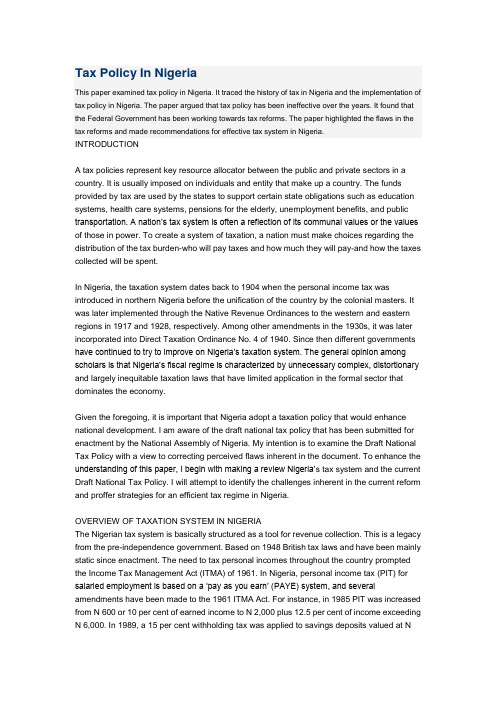
Tax Policy In NigeriaThis paper examined tax policy in Nigeria. It traced the history of tax in Nigeria and the implementation of tax policy in Nigeria. The paper argued that tax policy has been ineffective over the years. It found that the Federal Government has been working towards tax reforms. The paper highlighted the flaws in the tax reforms and made recommendations for effective tax system in Nigeria.INTRODUCTIONA tax policies represent key resource allocator between the public and private sectors in a country. It is usually imposed on individuals and entity that make up a country. The funds provided by tax are used by the states to support certain state obligations such as education systems, health care systems, pensions for the elderly, unemployment benefits, and public transportation. A nation’s tax system is often a reflection of its communal values or the values of those in power. To create a system of taxation, a nation must make choices regarding the distribution of the tax burden-who will pay taxes and how much they will pay-and how the taxes collected will be spent.In Nigeria, the taxation system dates back to 1904 when the personal income tax was introduced in northern Nigeria before the unification of the country by the colonial masters. It was later implemented through the Native Revenue Ordinances to the western and eastern regions in 1917 and 1928, respectively. Among other amendments in the 1930s, it was later incorporated into Direct Taxation Ordinance No. 4 of 1940. Since then different governments have continued to try to improve on Nigeria’s taxation system. The general opinion among scholars is that Nigeria’s fiscal regime is characterized by unnecessary complex, distortionary and largely inequitable taxation laws that have limited application in the formal sector that dominates the economy.Given the foregoing, it is important that Nigeria adopt a taxation policy that would enhance national development. I am aware of the draft national tax policy that has been submitted for enactment by the National Assembly of Nigeria. My intention is to examine the Draft National Tax Policy with a view to correcting perceived flaws inherent in the document. To enhance the understanding of this paper, I begin with making a review Nigeria’s tax system and the current Draft National Tax Policy. I will attempt to identify the challenges inherent in the current reform and proffer strategies for an efficient tax regime in Nigeria.OVERVIEW OF TAXATION SYSTEM IN NIGERIAThe Nigerian tax system is basically structured as a tool for revenue collection. This is a legacy from the pre-independence government. Based on 1948 British tax laws and have been mainly static since enactment. The need to tax personal incomes throughout the country prompted the Income Tax Management Act (ITMA) of 1961. In Nigeria, personal income tax (PIT) for salaried employment is based on a ‘pay as you earn’ (PAYE) system, and several amendments have been made to the 1961 ITMA Act. For instance, in 1985 PIT was increased from N 600 or 10 per cent of earned income to N 2,000 plus 12.5 per cent of income exceeding N 6,000. In 1989, a 15 per cent withholding tax was applied to savings deposits valued at N50,000 or more while tax on rental income was extended to cover chartered vessels, ships or aircraft. In addition, tax on the fees of directors was fixed at 15 per cent. These policies were geared to achieving effective protection for local industries, greater use of local raw materials, generating increased government revenue among others.Since the implementation of the structural adjustment programme (SAP), however, taxes have been used to enhance the productivity and competitiveness of business enterprises. Consequently, attention has been focused on promoting exports of manufactures and reducing the tax burden of individuals and companies. In line with this change in policy focus, many measures were undertaken. These involved, among others, reviewing custom and excise duties, continuing with the reduction of company and income taxes, expanding the range of tax exemptions and rebates, introducing capital allowance, expanding the duty drawback scheme and manufacturing-in-bond scheme, abolishing excise duty, implementing VAT, monetizing fringe benefits and increasing tax relief to low-income earners.CURRENT TAXATION REFORMS IN NIGERIAIn 2002, a Study Group (the SG) was inaugurated to review the entire tax system in Nigeria. The terms of reference included:• Review all aspects of the Nigerian Tax System and recommend improv ements therein.• Review the entire tax administration and recommend improvements in the structure for the whole country.• Consider measures to bring international developments in tax administration to bear in Nigeria.In 2004, a Working Group (the WG) was inaugurated to review the report and recommendations of the SG. –The WG agreed with the SG’s recommendations for a National Tax Policy and recommended the creation of an autonomous National Customs & Revenue Authority to assimilate all tax administration powers and duties with funding from retained tax revenues. The WG also reviewed each SG proposed modification to existing tax laws and provided comments thereon. They include, strengthening of Tax Administration, proposed prioritized strategies for implementing the proposed reform and passage of new tax Bills. Subsequent to the report of the WG in 2004, the government has presented the following tax legislation to the National Assembly:• The Federal Inland Revenue Service Act to establish the agency as an autonomous body and guarantee its funding from a percentage of retained tax collections.• Amendments to the Personal Income Tax Act, Companies Income Tax Act and the VAT Act.• For the most part, the amendment Bills reflect the recommendations of the SG and WG.7It is expected that the new tax legislation will be passed into law by 2006, however, today, 4 out of the 8 Tax Bills, namely; Bill for an Act to establish the FIRS as an autonomous Service, Bill for an Act to amend the Companies Income Tax Act, Bill for an Act to amend the Petroleum Profit Tax and Bill for an Act to amend the National Automotive Council Act have been passed by the National Assembly and signed into laws by President, Olusegun Obasanjo, on April 16, 2007, while the remaining four Tax Bills are still at the fiscal debate stage of the parliament.CHALLENGES OF THE DRAFT NATIONAL TAX POLICYA thorough examination of the current national taxation policy reveal that it is comprehensive when compared with earlier attempts at designing a policy. However, there are some perceived challenges that this draft is likely going to face because of the experiences of past taxation laws. These challenges are as follows:• Administrative Challenge. Experience has shown that the institutional cap acity to administer taxes effectively is woefully lacking in this country. Procedures, reinforced by third party audits, appear to ensure that taxes are paid and received albeit with potentially serious and costly internal lags. However, Nigeria lacks capacity to assess the reasonableness of the returns submitted by taxpayers, including costs and staffing, skills, pay scales, and other funding, and computer and Information Technology (IT) infrastructure. Meanwhile the current draft has not put in place an administrative strategy.• Compliance Challenges. A recurring problem with PIT Nigeria is the non-compliance of employers to register their employees and to remit such taxes to relevant authorities. To address this, in 2002 the government amended the 1993 PIT Act to make non-compliant employers liable to penalties up to N 25,000, as well as liable for the payment of all tax arrears. Employers failing to keep proper records would also face a penalty of N 5,000. A fine this small tends to encourage tax evasion since the penalty for being caught is lower than the cost for non-compliance. The issues of unremitted funds from the PAYE system and withholding taxes particularly among government ministries and agencies as well as lax adherence by all three levels of government to the approved list for (tax) collection, as stipulated by the 1998 Taxes and Levies Act 21, have over the past five years attracted the attention of Joint Tax Board (JTB). This same issue of compliance was not properly addressed in the draft national tax policy.• Lack of Equality. Tax in Nigeria especially (PIT) personal income tax always fails in Nigeria for lack of equitability. Even the present draft sent to the National Assembly could not provide solution to this challenge. In spite of the fact that the self-employed outnumber paid workers and that they earn as much as four times that of the formal sector employees, the bulk of PIT today is paid by employees whose salaries are deducted at source.• Challenge of Multiplicity of Taxes. The re is the challenge of multiplicity of taxes which is a major problem with the draft document. Already Nigeria is known for having problems with compliance. How does would the Federal Ministry of Finance grapple with this problem because it is not contained in the strategy document. It must be noted that a good tax policy set out the fundamental objectives of a country's tax system and prescribe some guidelines that would shape government policy actions.• Poor Taxation Drive from Tiers of Government. The political economy of revenue allocation in Nigeria even with the current draft document does not prioritize tax efforts. It is, instead, anchored on such factors as equality of states (40 per cent), population (30 per cent), landmass and terrain (10 per cent), social development needs (10 per cent), and internal revenue efforts (10 per cent). The approach, discourages a proactive revenue drive, particularly for internally generated revenue, makes all government tiers heavily reliant on unstable oil revenues which are affected by the volatility of the international oil markets. Asidefrom the national syndrome of ‘cake sharing’, the instability and volatility of oil revenue should have created an opportunity for improved tax efforts within the provisions on taxation ratified in the 1999 Constitution. Although some state governments have initiated measures to enhance their tax generation attempts, the outcome has not reflected any level of serious effort.THE WAY FORWARDPASS THE DRAFT NATIONAL TAX POLICY INTO LAWThe way forward from is for the government to implement the tax policy. A lot of resources and time has been invested in the current draft national tax policy. Even though there are obvious flaws in some areas, there is the urgent need for the National Assembly to pass it into law. A tax regime that lacks the policy hub cannot achieve the desire objectives.IMPROVE COMPLIANCE STRATEGYCompliance has always been a problem in Nigeria’s tax system. Even the current draft national tax document did not spell out clearly the compliance strategy. During the military era, the Tax Force Unit was used to enforce tax compliance. However, with democratic rule, this is not allowed and the use of the traditional court system is not only too cumbersome but also time consuming. To this effect, a bill for a tax court has been prepared by the state to replace the Tax Force. The bill has been discussed at the cabinet level, and is currently being amended by the Ministry of Justice after which it will be presented to the National Assembly. When this bill becomes operational, it is hoped that compliance will be improved.IMPROVE ADMINISTRATION OF TAXOne of the major challenges of tax in Nigeria is the administration of tax. Even the current draft national tax policy suggested the use of tax consultants to collect revenues from government ministries and agencies. This is a major flaw as PAYE does not give a true picture of performance. This is revenue that is collected at source with minimal effort and could easily be collected by government tax or revenue officials. Thus, the practice of including certain taxes (PAYE and other revenue deducted at source) within the government machinery as components of a revenue benchmark for tax consultants will not be a solution.STAK EHOLDERS’ CONSULTATIONIt is also imperative for government to consider taxpayers’ and other key stakeholders’ interests in fiscal policy formulation and implementation in order to achieve improved tax compliance rate in the country. In other words, since taxes are statute-derived, government should encourage far-reaching consultation across the broad spectrum of the economy in tax law formulation.CONCLUSIONThis paper examined the various steps so far taken by Nigerian government and relevant stakehold er in the Nigeria’s tax system. The paper further reviewed tax regime in Nigeria from the since 1904 to the ongoing tax reforms. It reviewed the tax reforms and concluded that the meets the requirement for a national tax policy. The paper however identified a number offlaws that could affect the efficient workability of the draft policy. It highlighted these flaws and proffered the way forward for Nigeria.RECOMMENDATIONSOn the basis of the foregoing, the following are recommended:• The current draft national tax policy should be passed into law by the National Assembly so as to make it a working document.• Government should consider taxpayers’ and other key stakeholders’ interests in fiscal policy formulation and implementation in order to achieve improved tax compliance rate in the country.• Government needs to improve the revenue allocation system so as to boost the taxation drive by the different tiers of government.NOTESAdekanola, O. ‘Efficient Tax Collection and Effective Tax Administration in Nigeria’. (A Paper presented at a seminar organized by the University of Lagos Consultancy Services Otta, 15 May 1997).Ajakaiye, D. O., and A. F. Odusola ‘Price Effects of Value Added Tax in Nigeria’. NCEMA Policy Analysis Series, 2 (2): 48-68. Ibadan: National Centre for Economic Management and Administration, 1996.Odusola, A. F. ‘Internally Generated Revenue at the Local Government: Issues and Challenges’. (A Paper presented at the Workshop on Revenue Generation at the State Government Level, Ibadan: University of Ibadan, October 2003).Draft Document on the National Tax Policy, updated as at 7 June 2008. (Presentation by the Presidential Committee on National Tax Policy).。
尼日利亚个人所得税法基本要素介绍
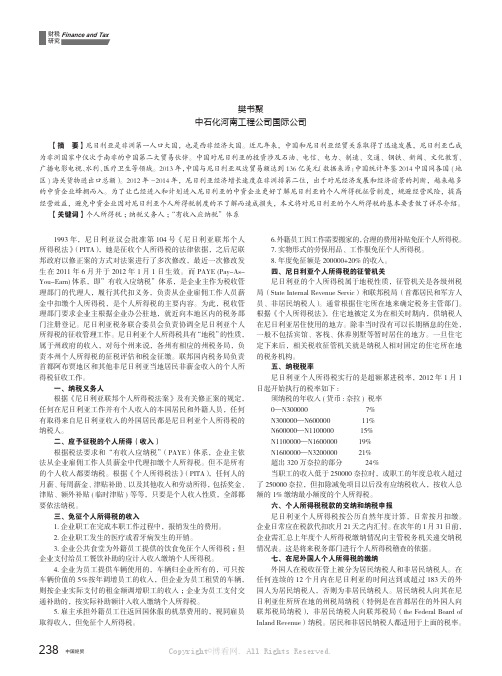
财税研究Finance and Tax 1993年,尼日利亚议会批准第104号《尼日利亚联邦个人所得税法》(PITA),她是征收个人所得税的法律依据,之后尼联邦政府以修正案的方式对法案进行了多次修改,最近一次修改发生在2011年6月并于2012年1月1日生效。
而PAYE (Pay-As-You-Earn)体系,即”有收入应纳税”体系,是企业主作为税收管理部门的代理人,履行其代扣义务,负责从企业雇佣工作人员薪金中扣缴个人所得税,是个人所得税的主要内容。
为此,税收管理部门要求企业主根据企业办公驻地,就近向本地区内的税务部门注册登记。
尼日利亚税务联合委员会负责协调全尼日利亚个人所得税的征收管理工作。
尼日利亚个人所得税具有“地税”的性质,属于州政府的收入,对每个州来说,各州有相应的州税务局,负责本州个人所得税的征税评估和税金征缴。
联邦国内税务局负责首都阿布贾地区和其他非尼日利亚当地居民非薪金收入的个人所得税征收工作。
一、纳税义务人根据《尼日利亚联邦个人所得税法案》及有关修正案的规定,任何在尼日利亚工作并有个人收入的本国居民和外籍人员,任何有取得来自尼日利亚收入的外国居民都是尼日利亚个人所得税的纳税人。
二、应予征税的个人所得(收入) 根据税法要求和“有收入应纳税”(PAYE)体系,企业主依法从企业雇佣工作人员薪金中代理扣缴个人所得税。
但不是所有的个人收入都要纳税。
根据《个人所得税法》(PITA),任何人的月薪、每周薪金、津贴补助、以及其他收入和劳动所得,包括奖金、津贴、额外补贴(临时津贴) 等等,只要是个人收入性质,全部都要依法纳税。
三、免征个人所得税的收入1.企业职工在完成本职工作过程中,报销发生的费用。
2.企业职工发生的医疗或看牙病发生的开销。
3.企业公共食堂为外籍员工提供的饮食免征个人所得税;但企业支付给员工餐饮补助的应计入收入缴纳个人所得税。
4.企业为员工提供车辆使用的,车辆归企业所有的,可只按车辆价值的5%按年调增员工的收入,但企业为员工租赁的车辆,则按企业实际支付的租金额调增职工的收入;企业为员工支付交通补助的,按实际补助额计入收入缴纳个人所得税。
- 1、下载文档前请自行甄别文档内容的完整性,平台不提供额外的编辑、内容补充、找答案等附加服务。
- 2、"仅部分预览"的文档,不可在线预览部分如存在完整性等问题,可反馈申请退款(可完整预览的文档不适用该条件!)。
- 3、如文档侵犯您的权益,请联系客服反馈,我们会尽快为您处理(人工客服工作时间:9:00-18:30)。
尼日利亚税收制度概述
2010年02月08日
尼日利亚制定了完整的税法。
为方便我对外投资合作企业更好地了解当地税制,现作一简要介绍。
一、尼税收征管体系
尼实行联邦制,设有联邦、州和地方三级政府。
与此相对应,尼税收征管也实行联邦、州和地方三级管理,各级政府负责征收不同的税种。
(一)联邦税
联邦税由尼联邦国内税收局(Federal Inland Revenue Service)负责征收,主要包括公司所得税、石油利润税、增值税、教育税、公司资本收益税、公司印花税、公司扣缴税、信息技术发展费等税种。
此外,联邦首都区居民的个人所得税、个人扣缴税、资本收益税、印花税,尼外交部职员、警察人员、武装人员的个人所得税,以及非尼日利亚居民的个人所得税也由尼联邦国内税收局征收。
(二)州内税
州内税由各州的州内税收委员会(State Board of Inland Revenue)负责征收,主要包括州内居民的个人所得税、个人扣缴税、资本收益税、赌博和彩票税,以及商用场所注册费、州首府道路注册费等。
(三)地方税
地方税由地方政府税收委员会(Revenue Committee)负责征收,主要是与地方政府行政管理有关的税费,比如酒税、出生和婚姻注册费、公共广告费、州首府以外的道路注册费、动物牌照费、电视许可费等。
二、尼税收征管程序
尼税务征收以纳税人申报为主,税务机关负责监督和催缴。
纳税的基本程序如下:
1、纳税人在就近的联邦国内税收局办公室或地方税务部门注册,取得税务编号;
2、纳税人在规定的纳税期内开展自评,计算出应缴税额;
3、纳税人根据自评结果填写税务申报表,连同审计报表、固定资产表、负债表等报表,到税务部门核准的银行[1]缴税。
银行代收税款及各种申报表后,向纳税人出具收款凭证;
4、纳税人依据银行凭证向税务部门换取正式收据,并办理完税证明。
三、尼主要税种
(一)公司所得税
根据尼公司所得税法,公司应就其一个纳税年度内的全部收益缴纳所得税。
应税收益包括经营收入、租金、分红、利息、折扣、特许权使用费、养老金收益、年金,以及来自于短期货币工具如政府债券的收益等内容。
1、纳税人
在尼从事经营活动并获得收益的所有公司,均构成纳税义务人。
但在尼注册设立的公司,以其全球范围内的收益计算应税收益,外国公司仅以其在尼获得的收益缴纳所得税。
2、税率
根据尼公司所得税法,该税的税率为应税收益的30%。
但如果企业在一个纳税年度内未获得利润,或其取得的全部利润少于公司所得税法规定的最低标准,则应按照最低纳税标准缴税,具体如下:
(1)营业额少于50万奈拉(包括50万奈拉),且已从事经营至少4个日历年度的,最低纳税标准为毛利润的0.5%;或净资产的0.5%;或实缴资本的0.25%;或企业该年度营业额的0.25%,但最高不超过50万奈拉;取其中最高者。
(2)营业额大于50万奈拉的,除依据上述标准缴税以外,还应就超过50万奈拉营业额的部分,按0.125%的税率缴纳。
(3)从事农业经营的公司;有25%以上外国投资的公司;及新设经营4年以内的公司,免于缴纳最低纳税额。
3、豁免
根据公司所得税法,向尼教会组织、慈善组织、教育组织和科研机构提供的捐助,免于缴纳公司所得税,但豁免金额不得超过捐助公司该年度收益总额的10%,以防其规避所得税。
4、纳税时间
公司从事经营超过18个月的,申报所得税的时间应为企业会
3、豁免
根据尼个人所得税法,部分津贴、补助不超过以下限额的,可以不缴纳个人所得税,具体如下:
(1)150000奈拉住房补贴/年;
(2)15000奈拉交通补贴/年;
(3)5000奈拉餐饮补贴/年;
(4)10000奈拉公用事业补贴(水电煤气)10000/年;
(5)6000奈拉娱乐补贴/年;
(6)离职津贴,但最多不超过其年基础工资的10%。
(三)增值税
根据尼增值税法,增值税包含在商品价格以内,在消费链的每个环节上,由出售商品的企业代政府向其消费者收取商品价格5%的增值税。
由于企业在购入原料时被代扣税款(进项税),同时在销售商品时又收取税款(销项税),尼增值税法规定,企业应以月为单位计算净增值税(销项税-进项税),将代收的盈余税款上交税务部门,或就被多扣的部分办理退税。
1、豁免
根据尼增值税法,以下商品或服务免征增值税:药品、书籍和教学资料、婴儿用品、农产品和农业设备、肥料、农用化学品、出口商品、医疗服务、宗教服务、社区银行和按揭机构提供的服务,以及出口服务。
2、注册
亿奈拉的,应向联邦国内税收局缴纳信息技术发展费,费率为企业税前收益的1%。
具体的纳税企业包括:1、GSM服务提供商和所有的电信公司;2、信息技术公司和因特网提供商;3、银行、保险公司及其他金融机构;4、与养老金有关的公司及经理人。
四、中尼双边税务协定
为避免对企业所得双重征税和防止偷税漏税,中尼两国政府于2002年4月15日签署了《关于对所得避免双重征税和防止偷漏税的协定》》(以下简称《协定》)。
经履行生效所必需的法律程序,《协定》自2009年3月21日起生效,自2010年1月1日起执行。
根据该协定,我对外投资企业在尼设立公司的,该子公司在中国取得的收入缴纳中国税收后,再缴纳尼税收时可将该部分应税收益抵免;我对外投资企业未在尼设立公司,则它在尼获得的收益缴纳尼税收后,可在中国税收中将该部分税额予以抵免,从而避免对所得双重征税。
此外,尼日利亚目前已与英国、加拿大、比利时、法国、南非、荷兰、菲律宾、巴基斯坦、罗马尼亚等国签署了双边税收协定,我对外投资企业可利用上述协定避免被双重征税或多征税。
